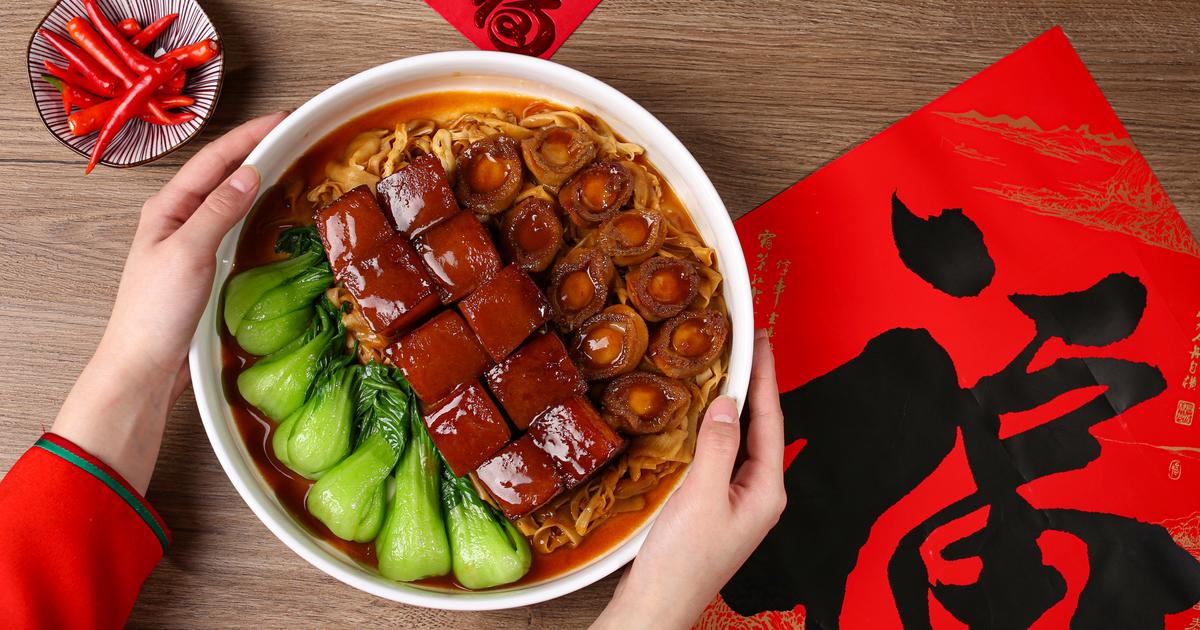Li Cheung, the 52-year-old chef of Beijing's Xin Ming Yuen restaurant, cannot forget the way his family marked Chinese New Year's Eve, either the 29th or 30th day of the 12th month of the lunar calendar.
This year the date fell on February 9.
For her mother, New Year's Eve was the busiest day of the year, much of which she spent in her kitchen.
Preparations started much earlier.
The planning of the feast took place on the 26th day of the 12th month of the lunar calendar.
During his childhood in Hong Kong, Mr. Li often accompanied his mother when she went shopping in the run-up to the Chinese New Year.
Ms. Li specialized in making poon choi, as well as rice and radish cakes.
Poon choi is a stew made from various ingredients, a dish prepared specifically for New Year's Eve.
In China, New Year's Eve meals are a showcase of regional diversity reflected in culinary traditions distinct from each other.
If common specialties based on fish or chicken have the honor of the table in the northern and southern regions, the Nordic custom of feasting on Chinese dumplings sets it apart.
Despite regional differences, the unifying theme of each dish symbolizes an auspicious start to the year and good fortune.
The shared essence of New Year celebrations is the coming together of families for this most traditional celebration.
Mr. Li, who has been a chef for 34 years, moved to Beijing from Hong Kong four years ago.
He dedicates every New Year's Eve to preparing special dishes for his restaurant's customers.
For this year's New Year's Eve, he gave his dishes lucky names such as the one he called
"Prosperity and Fortune"
, made from abalone and crow's feet.
Nostalgia seems to be in the air this year.
The TV movie
Blossoms Shanghai
, directed by Hong Konger Wong Kar-wai, was set in 1990s Shanghai and its phenomenal success attracted people to Huanghe Road and the Fairmont Peace Hotel on the Bund – who came to taste the nostalgia.
Pairing duck and roast chicken.
PROVIDED TO CHINA DAILY
Zhao Renliang, a chef from Shanghai with 60 years of experience, started his career at Peace Hotel.
For several years, for the Spring Festival, he has worked at the Macao Chinese Restaurant at the Legendale Hotel in Beijing.
Having noticed a growing interest in Shanghai cuisine following the TV film, Mr. Zhao planned a special Chinese New Year menu drawing inspiration from flavors typical of Shanghai as well as the provinces of Jiangsu and Zhejiang.
One dish stands out in particular:
yifanfengshun
(navigation in calm waters).
The chef chose to use large shrimp for this traditional Shanghai dish served with rice cakes and Chinese crab (also called Shanghai hairy crab) – the latter eliminating the messy handling of the shells.
A common dish on the New Year's Eve menu in Shanghai: a fondue made with various ingredients, including balls of egg dough shaped and colored like gold bars.
Mr. Zhao is offering such a hot pot this year for his New Year's Eve - with rich ingredients such as sea cucumber, abalone, pork tendons (mainly made of cartilage), shitake mushrooms and hand-shaped fish balls.
New Year's Eve is the most important meal of the year, explains author and culture scholar Cui Daiyuan:
"It's a reunion of family members with whom you share ties of blood and marriage »
.
Throughout China, fish is a typical specialty of the occasion, Mr. Cui continues:
“The fish must be whole because it symbolizes a full and smooth year.
It is often braised in soy, or cooked as a sweet and sour dish, both giving it a bright red color, a sign of good omen.
Traditionally, the carp is chosen as the epitome of good fortune
.
However, many families also opt for mandarin fish or sea bass.
After New Year's Eve, Beijing families generally prepare ravioli filled with vegetables.
Called
“Wugeng ravioli”
– a word which designates the period between 3 and 5 a.m. – they are therefore eaten in the early hours of the following day.
Afterwards, tradition dictates that we go out to visit relatives and exchange vows, says Mr. Cui.
In northeast China, dumplings, usually filled with meat, are a must-have during New Year's Eve.
Ren Pangbo, general manager of the Shenyang branch of Fengtian Restaurant in Liaoning Province, said people in the area traditionally cook pig's trotters, chicken and pork knuckles for this special meal.
Dishes of fish, shrimp and chicken grace the table in both the northern and southern regions of China.
PHOTOS PROVIDED TO CHINA DAILY
While it is traditional for families to gather at home for New Year's Eve, in recent years, eating out or ordering takeout has also become common.
Li Ran, the chef of JW Kitchen restaurant at JW Marriott Hotel Beijing Central, has three years of experience in preparing New Year's takeaway meals. He carefully selects his dishes so that they stay fresh for a long time after being delivered.
This year, he started preparing his takeout menu four months in advance.
Featured: a fish fried for such a long time that the head and tail curl.
The sauce is packaged separately, to allow customers to pour it over the fish before enjoying.

